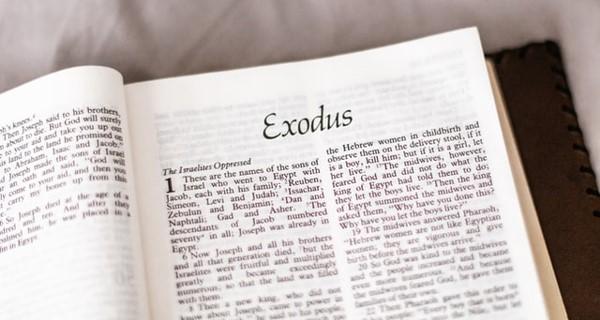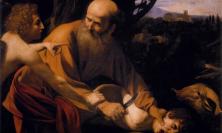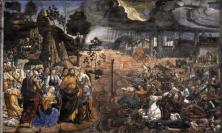John Barton, author of A History of the Bible, surveys the readings that Christians and Jews attend to during the Easter Vigil and the Passover seder, respectively, and considers what these texts tell us about how Scripture is understood in the two faiths. ‘The narrative that Jews construct out of the Hebrew Bible is distinctively different from the story Christians tell on the basis of these same books. Fruitful dialogue can only begin if these differences are recognised.’
What makes this night different from all other nights? (Passover haggadah)
Most blessed of all nights, chosen by God to see Christ rising from the dead! (Exsultet)
This year, Passover and Holy Week coincide, prompting some comparisons. The Passover meal, so central to Judaism, and the Easter Vigil, ‘the greatest and most noble of all solemnities’, are both celebrated at night or in the late evening. Superficially they are very different. Passover is celebrated in the home, the Paschal Vigil in church, and many of the themes, as we shall see, are quite divergent. But both represent a high point in the year for their respective communities, and both weave passages from Scripture together to tell a story.
The readings at the Easter Vigil range across the whole Bible, and must be read in association with the proclamation in the Exsultet. The first reading is the account of creation in Genesis 1, putting the celebration of Easter in a cosmic context and signalling that what we are to hear is the story of the universe, not simply of the Church. Next comes Genesis 22, the near-sacrifice of Isaac, telling of the precariousness of the divine promises but confirming that Abraham’s descendants will grow and multiply. Then we have, from Exodus 14, the account of the crossing of the Red Sea by the escaping Israelites – the one passage that, significantly, may not be omitted however much the Vigil may be abbreviated for pastoral reasons. There follow prophecies of blessing from Isaiah 54 and 55 and from Baruch, and then Ezekiel’s message that Israel is to receive a new heart and a new spirit through the sprinkling of clean water – interpreted by early Christians as a reference to baptism. These Old Testament readings lead into St Paul’s proclamation that in our baptism we are buried with Christ (Romans 6:3-11), and then to the gospel of the resurrection (this year, Mark 16:1-8).
Many of these same themes occur in the Exsultet. Rather than the creation, we have there the famous passage about Adam, whose ‘happy fault’ (felix culpa) ‘merited so great a Redeemer’. But we go on, just as in the readings, to the exodus and crossing of the Red Sea:
This is the night when first you saved our fathers: you freed the people of Israel from their slavery and led them dry-shod through the sea. This is the night when the pillar of fire destroyed the darkness of sin.
And again there is a reference to baptism, traditionally administered at this liturgy:
This is the night when Christians everywhere, washed clean of sin and freed from all defilement, are restored to grace and grow together in holiness.
The Passover haggadah, the text used at the Passover seder or supper, visits several of these same themes, telling the story of the oppression in Egypt and the rescue of the Israelites through the ten plagues and the miracle at the Sea. The answer to the child’s question – ‘What makes this night different from all other nights?’ – with which the whole event begins, is:
We were slaves to Pharaoh in Egypt, and the LORD our God brought us out of there with a strong hand and an outstretched arm. And if the Holy One, blessed be he, had not brought our fathers out of Egypt, then we and our children and the children of our children would still be enslaved to Pharaoh in Egypt. And even were we all wise, all intelligent, all aged, and all knowledgeable in the Torah, still the command would be upon us to tell of the exodus from Egypt; and the more one tells of the exodus from Egypt, the more admirable it is.
There are plenty of references to the patriarchs, Abraham, Isaac and Jacob, but no mention of Adam – not a particularly significant figure in the rabbinic Jewish account of things – nor of the creation of the world; and there is little from the prophets. But the Jewish and Christian liturgies for their most significant night of the year coincide in their emphasis on the exodus and crossing of the Sea.
It is there, however, that we also see most clearly the differences. The Passover celebration centres on the Jews and their miraculous rescue from Egypt, not as any kind of trope or symbol, but in its literal import, and its implication that God wishes his people to be free from political oppression on earth. For Christians, the exodus events are an allegory, an account of the deliverance from sin and death brought about through Christ. The Easter festival, the Exsultet assures us, is the true Passover:
This is the Passover feast, when Christ, the true Lamb is slain, whose blood consecrates the homes of all believers.
It belongs in the world of the typological interpretation of the Old Testament, where what happened to Israel literally is important for Christians symbolically. Christians are seen as the true heirs of the promises to the patriarchs, to Moses and to the prophets. The whole Bible, in this interpretation, tells a single story, which reaches from the creation, through the disobedience of Adam and the lives of the patriarchs to the exodus, the symbol of future redemption, but then on to the rest of the history of Israel, which is seen as finding its climax in the coming of Jesus Christ. This interpretation goes back clearly to St Paul, but is also implicit in the account of the heroes of the faith in Hebrews 11, where the whole of the history of Israel builds up to Jesus, the ‘pioneer and perfecter of our faith’.
I do not mean to imply that the Christian scheme for history is broad and universal and the Jewish one narrowly particularistic. On the contrary, the Christian reading of the Old Testament represents in some respects quite a narrow perspective on Scripture: events recorded there are important only as pointing forward to the revelation in Christ, meaning that it is Christians who are the ‘true’ Israel. According to the second century Epistle of Barnabas, even the story of creation in Genesis is really about ‘our’ re-creation rather than about the creation of the world. While, conversely, the concentration on the Jewish people in the haggadah is far from being simply particularistic, stressing as it does the vocation of Israel as a light to the nations. No one who has heard it can forget the quotation from the Talmud in which God describes even the hated Egyptians as ‘my creatures’ (Babylonian Talmud Megillah 10b). According to this saying, when the waters of the sea returned and trapped the fleeing Egyptians, the angels wanted to sing a song of praise, but God said: ‘My creatures are drowning in the sea, and you wish to sing a song?’
The description of the celebration of Easter as ‘the Passover of the Lord’ in the Exsultet may in fact be seen as an example of Christian supersessionism – the belief that, because of the coming of Jesus, Judaism is a spent force and should pass away. For Christians this is an interesting theological issue that can be discussed at a high theoretical level. For Jews it is a deeply threatening attitude, which can be used, and has been used, to justify cultural anti-Semitism, and at worst pogroms and the Holocaust. What to a Christian is the sublime beauty and joy of the Paschal Vigil can seem to Jews a triumphalistic gloating. Nor can this be remedied through the modern tendency, prevalent among some evangelical Christians, of holding a Christian version of the Passover seder on Holy Thursday, a well-intentioned but disastrous piece of cultural appropriation, which is about as favourably received by Jews as a Jewish staging of the Eucharist would be by Christians. (Attending a real Passover seder as an invited guest is quite another matter.)
A comparison of the Passover with Easter thus leads us into deep and choppy waters. For a Christian as for a Jew, the central Old Testament/Hebrew Bible event that is celebrated is the exodus. But the exodus has quite distinct meanings: for Jews as a reality that points to liberation from foreign oppression; for Christians as a symbol standing for freedom from sin and death. This points us to a difference in reading the Old Testament Scriptures so great that one can come to doubt the cliché that Jews and Christians ‘share’ the Hebrew Bible as part of the ‘Judaeo-Christian tradition’.
The difference was well summed up by the Jewish scholar, Moshe Goshen-Gottstein: for Christians, he wrote, the Old Testament is about God, humanity and salvation; for Jews, the Hebrew Bible is about God, people and land. The vision of the Exsultet, and of the selection of readings that follow it, is of salvation through the death and resurrection of Christ for anyone who is baptised and believes – which is both universalistic and particularistic at the same time. The vision of the Passover haggadah is of liberation for Jews in the present hostile world through the power of the God who once acted to set them free from bondage in Egypt, and who wishes them to be a blessing to the whole world through their steadfast witness and espousal of values of truth and justice – which is also both particularistic and universalistic.
The two faiths operate in different modes, even though both centre on one great event – for Jews, the exodus; for Christians, the resurrection of Christ (understood as a ‘new exodus’). Christians will never understand Judaism if they insist on asking how it answers a list of questions posed from within the Christian worldview. Christians want to know how other religions see salvation from death, the origins of sin, God’s plan for all humanity, and the nature of the human person and of the one they recognise as the ultimate human person – Jesus Christ, both God and man. Judaism can give answers to all those questions, but they are not where its beating heart lies. It lies with God’s choice of a people to be his faithful witnesses in the world, the gift to them of a particular land (of course a contested claim), and the Torah as the system by which they are to live. That is what Jews construct out of the Hebrew Bible, and it is distinctively different from the story Christians tell on the basis of these same books. Fruitful dialogue can only begin if these differences are recognised.
That recognition in turn requires a prior realisation that the two faiths enshrine particular constructions of the overall meaning of the Bible, not belief systems that can simply be read off from it. Protestants like me have trouble with this, because of the theory called sola scriptura: Scripture alone as the basis of faith. That leads to the idea that the Bible points unequivocally to one single way of understanding God and humanity, and that any other way is simply mistaken. Hence Judaism, which tells a different story on the basis of Scripture, must be wrong. But Catholics, like Jews themselves, do not carry the freight of that theory and are free to acknowledge that there are many possible paths through the Scriptures of the Old Testament, many possible stories one can tell from them. The distinctively Christian way of reading the Bible is not obvious, but depends on the framework provided by the creeds and confessions of the Church. These are expressed also in texts such as the Exsultet, and in the choice of selections from Scripture such as that used at the Easter Vigil. Similarly, in order to learn how Judaism hangs together it is not enough to read the Hebrew Bible: we need an interpretative framework. That framework is visible in texts such as the Passover haggadah, as well as in the lived experience of Jews trying to observe the Torah faithfully. Neither Judaism nor Christianity is simply a ‘biblical religion’.
John Barton is Emeritus Oriel & Laing Professor of the Interpretation of Holy Scripture in the University of Oxford, and a Senior Research Fellow of Campion Hall. He is an Anglican priest.






